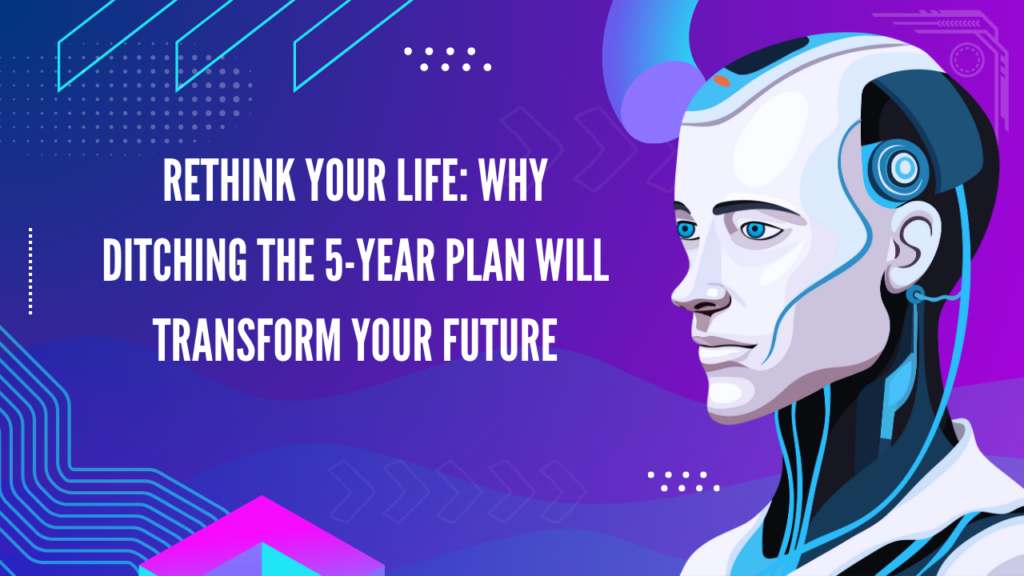Advertisement:
With over 25 years of experience as a business consultant, Abdul Vasi has helped countless brands grow and thrive. As a successful entrepreneur, tech expert, and published author, Abdul knows what it takes to succeed in today’s competitive market.
Whether you’re looking to refine your strategy, boost your brand, or drive real growth, Abdul provides tailored solutions to meet your unique needs.
Get started today and enjoy a 20% discount on your first package! Let’s work together to take your business to the next level!
Introduction
The idea of a 5-year plan has long been a staple of career and life advice. It encourages individuals to set long-term goals, map out a path to achieve them, and work diligently towards those milestones. While having a plan is undeniably valuable, the rigidity of a 5-year plan can sometimes stifle spontaneity, creativity, and growth. In today’s fast-paced, ever-changing world, a more dynamic approach can be incredibly beneficial.
This blog post explores a revolutionary concept that challenges the traditional 5-year plan. By embracing a more flexible and adaptive mindset, you can unlock new opportunities, foster personal growth, and enhance your overall life satisfaction. Here’s what you should do instead.
Embrace the Power of Short-Term Goals
Why Short-Term Goals?
Short-term goals offer several advantages over long-term plans. They allow for flexibility, adaptability, and immediate feedback. When you set short-term goals, you can quickly assess your progress and make adjustments as needed. This approach helps maintain motivation and momentum, as you achieve smaller milestones more frequently.
Benefits of Short-Term Goals:
- Flexibility: Adapt to changes and unexpected opportunities.
- Immediate Feedback: Quickly see what’s working and what’s not.
- Enhanced Motivation: Frequent achievements keep you motivated.
- Reduced Pressure: Lower stress compared to long-term plans.
Setting Effective Short-Term Goals
To set effective short-term goals, follow these steps:
- Identify Your Priorities: Determine what’s most important to you right now. This could be related to your career, personal life, health, or hobbies.
- Be Specific: Clearly define your goals. Instead of saying, “I want to get fit,” specify, “I want to exercise for 30 minutes, three times a week.”
- Set a Time Frame: Give yourself a deadline. Short-term goals typically range from a few days to a few months.
- Break Down Tasks: Divide your goals into smaller, manageable tasks. This makes them less overwhelming and easier to achieve.
- Track Your Progress: Regularly review your progress and make adjustments as needed.
Example: Fitness Goal
Instead of setting a 5-year goal to lose a certain amount of weight, break it down into short-term goals. For instance:
- Month 1: Exercise for 30 minutes, three times a week.
- Month 2: Increase exercise to 45 minutes, four times a week.
- Month 3: Incorporate strength training twice a week.
By focusing on these smaller, short-term goals, you can adapt your plan based on your progress and any changes in your life.
Adopt a Growth Mindset
Understanding the Growth Mindset
A growth mindset, a concept developed by psychologist Carol Dweck, is the belief that abilities and intelligence can be developed through dedication and hard work. This mindset contrasts with a fixed mindset, which holds that abilities are static and unchangeable.
Benefits of a Growth Mindset:
- Increased Resilience: Bounce back from setbacks and view challenges as opportunities.
- Enhanced Learning: Embrace new skills and knowledge with enthusiasm.
- Greater Achievement: Reach higher levels of success through persistence and effort.
Cultivating a Growth Mindset
To cultivate a growth mindset, practice the following strategies:
- Embrace Challenges: View challenges as opportunities to grow, rather than obstacles to avoid.
- Learn from Criticism: Use constructive criticism as a tool for improvement.
- Celebrate Effort: Focus on the effort you put in, rather than just the outcome.
- Persist in the Face of Setbacks: Treat setbacks as learning experiences and keep pushing forward.
Example: Career Development
Instead of a rigid 5-year career plan, adopt a growth mindset approach:
- Seek New Challenges: Take on new projects that push you out of your comfort zone.
- Learn Continuously: Pursue new skills and knowledge relevant to your field.
- Adapt to Change: Stay open to new opportunities, even if they deviate from your original plan.
Focus on the Present Moment
The Importance of Mindfulness
Mindfulness, the practice of being present and fully engaged in the current moment, can significantly enhance your quality of life. By focusing on the present, you can reduce stress, improve mental clarity, and increase your overall well-being.
Benefits of Mindfulness:
- Reduced Stress: Decrease anxiety and worry about the future.
- Improved Focus: Enhance concentration and productivity.
- Greater Enjoyment: Fully appreciate and enjoy each moment.
Practicing Mindfulness
Incorporate mindfulness into your daily routine with these practices:
- Mindful Breathing: Take a few minutes each day to focus on your breath. This can help center your mind and reduce stress.
- Body Scan Meditation: Pay attention to different parts of your body, starting from your toes and moving up to your head. Notice any sensations without judgment.
- Mindful Activities: Engage fully in everyday activities, such as eating, walking, or even washing dishes. Pay attention to the sensory details of the experience.
Example: Personal Relationships
Instead of worrying about where your relationships will be in 5 years, focus on being present in your interactions:
- Listen Actively: Give your full attention to the person you are with.
- Express Appreciation: Regularly show gratitude and appreciation for your loved ones.
- Enjoy Shared Moments: Fully engage in and savor the time you spend together.
Embrace Flexibility and Adaptability
The Need for Flexibility
Life is unpredictable, and rigid plans can be limiting. Embracing flexibility allows you to adapt to changing circumstances and seize new opportunities as they arise.
Benefits of Flexibility:
- Reduced Stress: Less anxiety about sticking to a rigid plan.
- Greater Opportunities: Ability to take advantage of unexpected opportunities.
- Enhanced Creativity: Open to innovative solutions and ideas.
Developing Flexibility
To develop flexibility, practice the following:
- Stay Open-Minded: Be willing to consider new perspectives and ideas.
- Adjust Plans as Needed: Regularly review and adjust your plans based on your current situation and goals.
- Embrace Change: View change as a natural and positive part of life.
Example: Career Path
Instead of a fixed 5-year career plan, stay open to new opportunities:
- Explore Different Roles: Try different roles within your field to find what you enjoy most.
- Network Actively: Build connections with people in your industry to stay informed about new opportunities.
- Be Willing to Pivot: If a new opportunity aligns better with your goals and values, be willing to change direction.
Prioritize Well-Being
The Role of Well-Being in Success
Well-being is a critical component of long-term success and satisfaction. Prioritizing your physical, mental, and emotional health can enhance your motivation, productivity, and overall happiness.
Benefits of Well-Being:
- Increased Energy: Better physical health leads to higher energy levels.
- Improved Mental Clarity: Good mental health enhances focus and decision-making.
- Greater Happiness: Emotional well-being contributes to overall life satisfaction.
Strategies for Enhancing Well-Being
Incorporate these strategies into your life to enhance your well-being:
- Physical Health: Maintain a healthy diet, exercise regularly, and get enough sleep.
- Mental Health: Practice mindfulness, seek therapy if needed, and engage in activities that stimulate your mind.
- Emotional Health: Foster positive relationships, practice gratitude, and take time for self-care.
Example: Balancing Work and Life
Instead of a 5-year plan focused solely on career achievements, prioritize well-being:
- Set Boundaries: Establish clear boundaries between work and personal time.
- Take Breaks: Regularly take breaks to rest and recharge.
- Engage in Hobbies: Make time for activities you enjoy outside of work.
Real-Life Success Stories
Oprah Winfrey: Embracing Flexibility and Growth
Oprah Winfrey, a media mogul and philanthropist, attributes much of her success to her ability to adapt and grow. Rather than adhering to a rigid plan, Oprah embraced opportunities as they arose, continually evolving her career and personal life.
Key Takeaways:
- Stay Open to Opportunities: Oprah’s willingness to explore new opportunities led to her diverse and successful career.
- Focus on Growth: She continually sought personal and professional growth, leading to her immense success.
- Prioritize Well-Being: Oprah emphasizes the importance of self-care and well-being in achieving long-term success.
Steve Jobs: The Power of Short-Term Goals
Steve Jobs, the co-founder of Apple Inc., was known for his intense focus on short-term goals. By breaking down his vision into smaller, actionable steps, Jobs was able to drive innovation and achieve remarkable success.
Key Takeaways:
- Set Clear Short-Term Goals: Jobs’ focus on specific, short-term goals led to significant advancements in technology.
- Adapt and Innovate: He was willing to pivot and adapt his plans based on new information and opportunities.
- Maintain Focus: Jobs’ ability to concentrate on immediate tasks contributed to his productivity and success.
Brené Brown: Prioritizing Well-Being and Authenticity
Brené Brown, a renowned researcher and author, emphasizes the importance of well-being and authenticity. By prioritizing her mental and emotional health, Brown has built a successful career while maintaining a balanced and fulfilling life.
Key Takeaways:
- Embrace Vulnerability: Brown’s research highlights the power of vulnerability in personal and professional growth.
- Prioritize Self-Care: She practices self-care to maintain her mental and emotional well-being.
- Stay Authentic: Brown’s commitment to authenticity has resonated with millions and contributed to her success.
Conclusion
Ditching the traditional 5-year plan in favor of a more flexible and adaptive approach can significantly enhance your life satisfaction and success. By focusing on short-term goals, cultivating a growth mindset, practicing mindfulness, embracing flexibility, and prioritizing well-being, you can navigate life’s uncertainties with confidence and resilience.
This one idea—shifting from a rigid plan to a dynamic approach—can truly change how you think about your entire life. Start implementing these strategies today, and experience the transformative power of a more flexible, adaptive, and fulfilling approach to life.




